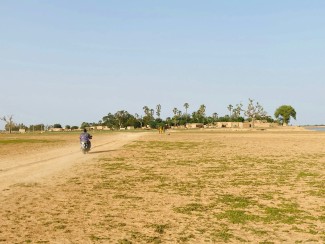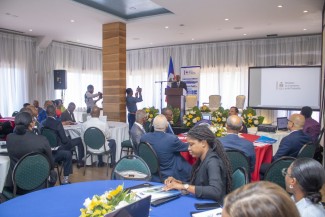Trade has a critical role to play in rebuilding developing and least developed countries’ economies, alleviating rising poverty and creating a greener, more inclusive future for all. This was a unifying theme that ran through three days of panels discussions and debates at the Aid-for-Trade Stocktaking event the World Trade Organization (WTO) hosted online from March 23 to 25.
Covid-19 has reversed 30 years of development gains, deepening inequalities from the household to country level and threatening to push 150 million into extreme poverty, WTO Director-General Ngozi Okonjo-Iweala noted in an opening plenary session that also brought together leaders from the International Monetary Fund (IMF), Organization of Economic Cooperation and Development (OECD), UNCTAD, World Bank and World Health Organization (WHO).
The opportunity to take stock of Aid for Trade’s progress so far and steer its future direction comes at a critical juncture, especially for those least developed countries (LDCs) that were hit hardest by the steepest fall in global trade on record and have benefited least from its rebound. “The post-Covid recovery must not leave anyone or any country behind,” she stressed.
Here are 6 takeaways from the event:
Invest in pharmaceutical supply chains and ensure equitable access to vaccines
With just 10 countries receiving 76% of the Covid-19 vaccines administered globally by the time of the event, ensuring more equitable access is critical. Ramping up vaccine production by investing more in LDCs’ and developing countries’ manufacturing capacity would help, as would boosting trade cooperation to address supply bottlenecks and lowering regulatory hurdles to facilitate vaccine purchases.
The creation of geographically diverse medical supply chains represents an opportunity for export-oriented investment in many low- and middle-income countries (LMICs), argued Okonjo-Iweala. Finding a way to share certain intellectual property rights while incentivising research and development will also improve resilience in the face of future health crises, she added.
Speakers at other sessions highlighted a need for regulatory mechanisms to support developing countries’ integration with global supply chains as well as the free movement of skilled workers. LDCs also need support in pivoting existing manufacturing capacity to meet the needs of medical and pharmaceutical supply chains, which will additionally help their economies diversify. For example, Ethiopia, Madagascar, South Africa, and Vietnam boast robust textile industries that could help meet surging demand for personal protective equipment, noted Spring Gombe of the UN Technology Bank for LDCs.
Expand LDCs’ access to finance with innovative tools and capacity building
Identifying innovative, sustainable sources of funding is vital for LDCs’ recoveries, speakers agreed. Although Aid-for-Trade funding to LDCs has grown 13% annually since 2006, reaching $13.5 billion in 2018, the pandemic threatens to slow or reverse this trend. Some OECD scenarios envision an up to $14 billion decline in official development assistance at a time when the pandemic is widening the $1.5 trillion trade finance gap.
Solutions highlighted by the IFC included risk-sharing facilities with first-loss guarantees, and blended concessional finance, for example through the IDA Private Sector Window.
Just 6% of private finance mobilised by blended finance in 2012-2018 however went to LDCs, noted Olivier Cattaneo from the OECD. He called for a higher proportion of grant funding within Aid for Trade, more equity investment rather than loans from the private sector, plus greater focus on capacity building to help LDCs navigate the thousands of instruments now on offer.
A new series of Trade Funding Insight briefs from the Enhanced Integrated Framework (EIF) aims to help here. The EIF has also partnered with the Islamic Trade Finance Corporation (ITFC) to offer technical assistance and capacity building around trade and trade finance to financial institutions in LDCs.
Several speakers also called for debt relief, noting that plunging incomes and investments in economic stimulus are pulling more into debt distress.
Facilitate trade with supportive regulatory frameworks
The importance of eradicating tariff and non-tariff barriers, and of developing legal, regulatory and commercial environments and infrastructure that are supportive of free trade and help integrate LDCs into the global trade networks was also stressed.
LDCs need support to develop investor-friendly regulations that will help them diversify their economies and improve their export competitiveness but also ensure that local MSMEs are able to fully participate in trade opportunities, speakers argued. WTO Chair Holder Leila Baghdadi, for example, called for a relaxation of local content requirements and argued that trade restrictions ultimately result in a “tax of poor people” as they drive up inflation and increase the cost of essential goods in LMICs.
Help MSMEs benefit from digitisation and tap opportunities in e-commerce
LDCs need investments in infrastructure and skills to benefit from rapid growth in e-commerce and trade digitisation, or risk being left further behind. Henri Monceau of the Organisation Internationale de la Francophonie (OIF) noted that 81% of people in LDCs lack internet access and said it would take $450 billion to close the growing digital divide.
EIF investments to date include its partnership with UNCTAD to integrate Vanuatu’s customs and postal systems to facilitate the clearance of goods for e-commerce trading partners.
Cambodia’s E-Commerce Acceleration and Go4eCAM initiatives were also provided as examples of how multi-pronged approaches – combining investments in regulations, ICT infrastructure, payment systems, digital skills and marketing – can help MSMEs in LDCs formalise and expand their e-commerce businesses.
Empower women with digital skills, mobile money and gender-sensitive policies
With millions of women and girls in LDCs and developing countries pulled out of education at the very time the pandemic was accelerating digitisation, many see opportunities for cross-border trade – such as those unleashed by the African Continental Free Trade Area – moving further out of reach. They must therefore be empowered, speakers argued.
To this end, an EIF partnership with the ITU in Burundi, Haiti and Ethiopia is working to mainstream gender perspectives in domestic policies and regulations to ensure women participate fully in the digital economy. Training in digital literacy and e-commerce skills has also been prioritised for 3,500 women-owned businesses supported by the SheTrades Commonwealth project.
To enable women to engage in digital trade, especially cross-border, their access to mobile money must also be improved. While women are 7% less likely to own a mobile phone than men in LMICs, they are 33% less likely to own a mobile money account noted Tamara Dancheva at GSMA.
International Trade Centre (ITC) figures show that women own only 15% of the world’s SMEs that export, despite them owning a third of all SMEs. They must therefore be supported into more lucrative export-related jobs and industries. Trade policies that disproportionately negatively impact women – such as tariffs on garments and apparel – must also be addressed, said Antonio Nucifora at the World Bank.
Invest in climate resilience to boost sustainability and revive tourism
Developing and least developed countries need investment and assistance to adapt to climate change, build climate-resilient infrastructure and create greener and more diversified economies. Governments must also seize opportunities to incorporate climate-friendly policies into their recovery plans, argued OECD Secretary-General Angel Gurría, adding that opening trade channels will help widen the availability of environmental technologies, goods and services.
Strengthening climate resilience and environmental health, especially in remote island states, is also crucial for the sustainable recovery of LDC’s pandemic-battered tourism industries. Travel- and tourism-related trade have missed out on a broader rebound in global trade in recent months, remaining two-thirds below pre-pandemic levels in the third quarter.
Initiatives that demonstrate the link between investments in climate resilience and tourism trade include the EIF-backed Tourism Infrastructure Project, which helped revive tourism in Vanuatu by relied by rebuilding cyclone-damaged waterfronts.
Countries in tropical regions will be particularly impacted by climate change, so will need support to identify new comparative advantages, adapt production methods, diversify their economies and build respective value chains while climate-proofing existing activities, said UNCTAD Acting Secretary-General Isabelle Durant. However, “these measures do not come for free,” she stressed. With only 3% of Aid for Trade disbursements currently allocated to climate action, “we can do more.”
If you would like to reuse any material published here, please let us know by sending an email to EIF Communications: eifcommunications@wto.org.



